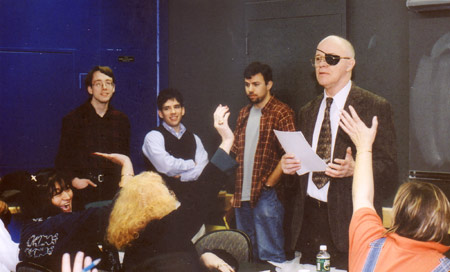The beauty of numbers
Local teachers extend themselves in pilot class

After three hours of mathematics one recent Saturday morning, 25 Boston middle school teachers paused briefly for lunch, after which they began their fourth hour of class totally engaged with the question of how to show that the square root of 2 is an irrational number. What would make a group that works hard all week so enthusiastic about devoting five whole Saturdays to something as demanding as the theory of numbers? Participants in this past fall’s special pilot Extension School course, Math E-301, cite three main reasons: the challenge of exciting and experienced instructors; the encouragement of educational leaders; and the beauty of the subject itself.
The primary instructor for Math E-301 knows firsthand about the joys and frustrations of teaching public school every day in Boston. Paul Sally grew up in Roslindale, then taught high school in Dedham and Boston before going on to become a distinguished research mathematician. Now a professor of mathematics at the University of Chicago, Sally flew into town weekend after weekend over the past months just to work with E-301.
Math E-301 takes its inspiration from the number theory course Sally created as part of a certification program, called SESAME, that he runs for teachers in Chicago. His slogan is, “If you want to teach mathematics, you better know some.” Working with Sally and E-301 this fall to adapt that program for Massachusetts teachers were Harvard Mathematics faculty John Boller, Stephen DeBacker, and Daniel Goroff, along with Harvard and Massschusetts Institute of Technology students, including Bridget Tenner ’01 and graduate student in Harvard’s Mathematics Department Nicholas Ramsey. The class was hosted by the Derek Bok Center for Teaching and Learning located in Harvard’s Science Center.
To celebrate the successful conclusion of E-301, Dean Michael Shinagel of the Division of Continuing Education presided over a luncheon and ceremony for the Boston school teachers, where he presented each participant with a special certificate. Through its Lowell Scholarship Program, the Extension School has made it possible for local teachers to take courses like E-301 and count them toward advanced degrees while paying no more than half the usual tuition. Shinagel recalled that Harvard’s Extension Program was founded 93 years ago by President A. Lawrence Lowell at the request of Florence Leadbetter, a Boston school teacher who was seeking ways for local teachers to study and obtain certification outside of normal school hours.
Also on hand was Alan Stone, Harvard’s new vice president for Government, Community and Public Affairs, who called the effort put into making E-301 work “a great indication of Harvard’s priorities.”
Earlier in the fall, the Massachusetts Commissioner of Education David J. Driscoll visited the new E-301 class. Driscoll knows Sally’s teaching well, having been a student in his calculus class while at Boston College. “Watching Paul Sally teach reminds me of my experience in his classroom as a freshman calculus student,” the commissioner recalls. “He makes mathematics exciting and relevant, and his enthusiasm for his subject is contagious. While he is a great teacher for students, he is the perfect teacher for classroom teachers.”
The irrationality of root 2 was probably not an issue that students knew could be so fascinating when they entered E-301. (Calculators cannot tell the difference between rational and irrational numbers, and the proof that root 2 cannot be expressed as a ratio of integers will not necessarily appear in statewide examinations.) But having studied the axioms for various number systems and the details of how decimals represent numbers, the class participants were eager to take guesses, make suggestions, work examples, ask and answer questions, investigate conjectures, and refine their reasoning about an argument that people have found beautiful ever since Euclid. As one participant wrote, “This class is a great eye-opener that has helped me restructure my teaching techniques in my classroom.”
Another Boston Public School teacher summed up her experience in E-301 by writing, “This was the best course I have ever taken. Because Professor Sally so clearly loves talking about math and doing what he is doing, it seemed valuable enough to give up my Saturdays. I have never been exposed to any professor that is able to portray his love and fascination with a subject as much as he can. He makes the love of math infectious.”
The pilot program for local teachers will continue this spring with a new extension class, E-303, on “Teaching Algebra.” More of the course will be conducted by Harvard faculty this time, but Sally loves working with teachers like this too much to stay away, and so he is planning to fly in again for a few of the sessions. For more information about these and other courses that teachers can count toward degrees, certificates, or professional development credits, visit the Extension School Web site at http://www.extension.harvard.edu/.




